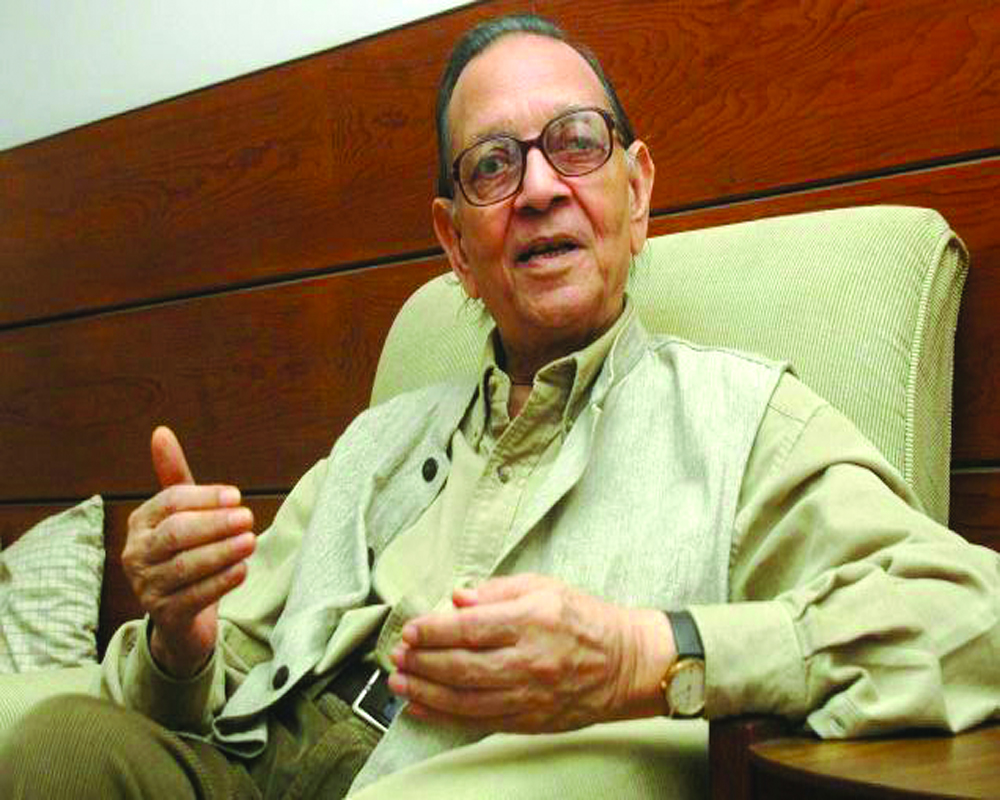Khushbu Kirti remembers the renowned Hindi poet and writer Kunwar Narayan on his 94th birth anniversary
‘Jab bhi maine vidroh kiya aur apne chotepan se upar uthna chaha,
Mujhe laga ki apne ko bada rakhne ki choti se choti koshish bhi,
Duniya ko bada rakhne ki koshish hai.’
(Whenever I protested and tried to lift myself from my inferiorities, I realised the smallest attempts to uplift myself... were a step in the direction of elevating and inspiring the entire world.)
The Hindi poet, who was intricately linked to the New Poetry Movement of the 20th century, was born in the pre-independent India’s Faizabad. The poet would have turned 94 yesterday. Often called the ‘meditative poet’ for his deep rumination on the present with regard to myth and history, Kunwar Narayan is highly regarded for his poetry that is a unique amalgamation of the simple and the complex.
His intellectual calibre was par excellence, clearly evident from the fact that he translated works of French symbologists like Mallarme, Valery, and poets like Cavafy, Borges.
Not many of modern Indian readers would know this but the seminal writer was an ardent traveller who also met high dignitaries like Pablo Neruda, Nazim Hikmet Ran, and Anton Slonimskie on his first trip to Europe, China and Russia in 1955 itself. He is read widely and is famous for blending an international modern sensibility with a deep grounding in Indian history, thought and tradition.
Narayan, thus, won numerous prestigious awards in his lifetime like the Sahitya Akademi Award, Jnanpith award in 2005 and the Padma Bhushan in 2009, and so many more. The writer was internationally recognised as he won the Warsaw University’s honorary medal, Italy’s Premio Feronia, et al.
The litterateur, who studied English Literature at Lucknow University, has a nazaqat and nafasat that can be spotted in his writings, very native to Lucknow. He wrote for almost six decades and his poems are a testament to the development of social awakening. His poems like Jade Ki Ek Subah, Basant Ki Leher, Basant Aa, Suryast, and so on, are embodiments of nature itself. One of my favourite lines ‘Life has many sides, and time’s eternal siege sides with none’ conveys what was a dictate he earnestly followed by him in his life.
His poem Rekha Ke Dono Or (English: On Both Sides Of The Line) is a highly complex poem, with metaphorical geometrical and mathematical references that one is surrounded by. In a manner, it becomes philosophical poem, too. ‘Ek bindu se dusre tak, ek seedhi rekha me agar ve daudta chala jata toh bhi jagah do saaf hisso me bati hui dikhti...’ (From dot to dot, if he ran in a straight line, the psace would seem split into two clear halves...). He conveys that, ultimately, we start from one point, which is our own perception. However, when we move ahead in life, cross the line, and see other perspectives, we begin to understand the other side and find ourselves in absolutely new places and circumstances. There are certain crossroads, but there is an idea that lies between what is right and what is wrong, too. Mithya lies in between satya (truth) and asatya (untruth), Narayan cogitated in the poem.
Kunwar Narayan’s son Apurva Narayan translated numerous poems of his into English. Apurva’s book of translations No Other World was published from India and England. A Cambridge University alumni, Apurva’ s personal interest is in literature, too.
His poems embody a rare purity and a profound humanism. In a section titled Humanesque, by Apurva, is highlighted the poem When One Can’t Remain Human. Therein, the poet writes about the limits of being human, ‘If times are bad, one can’t remain human. Yet all he aspires to is to become a human being.’ A master of philosophical poems, Narayan ventured the realm of universal thought. In the poem called Medium, he transcends his personal limitations as a human being. It is not surprising to learn that one of his major themes is about becoming human. In his popular poem Falcon, he describes the falcon who has a God-like view, who analyses how futile human activities are, and how insecure humans are even while living out of danger, on the still ground, unlike the falcon.
Since his first book in 1956, his personal qualities that of nobility gentle nature, are reflected in his characters. His oeuvre spans across various genres — stories, criticism, translations, jottings and writings on cinema and art, essays, poetry, and epic poems.
There can be witnessed a healthy outlook towards love in his poetry. The poet used vivid, simple, and emotional imagery, and figures of speech. He also made natural use of Khadi boli in his writings. He was fond of exploring the absurd, and touching upon intimate details in his work.
What characterises Narayan’s poetry is the graceful and delicate balance between thought and language, structure and content; his fluent words render meaning to abstract ideas. His themes also engulf social reality. In poems like Ayodhya, he wrote of the city of Ayodhya that he knew very well, having spent some part of his precious childhood there and witnessing the Hindu-Muslim riots in 1992. ‘O Rama! Life is a bitter fact and you are an epic,’ he expressed. Narayan shared about places like Kafka’s Prague, and Krakow Zoo. In Nalanda and Bakhtiyar, he mentioned the tyrant and conqueror who destroyed the renowned Buddhist centre of learning.
When Narayan was once asked by an interviewer about the role of thought and intellect in poetry, he is reported to have said, “Pretty much the same as in our life, namely, to enhance a better understanding of life, sensitivity and a sense of justice.” He claimed in his poem Amir Khusro that he wanted to be ‘free like the thoughts of a poet’.


























